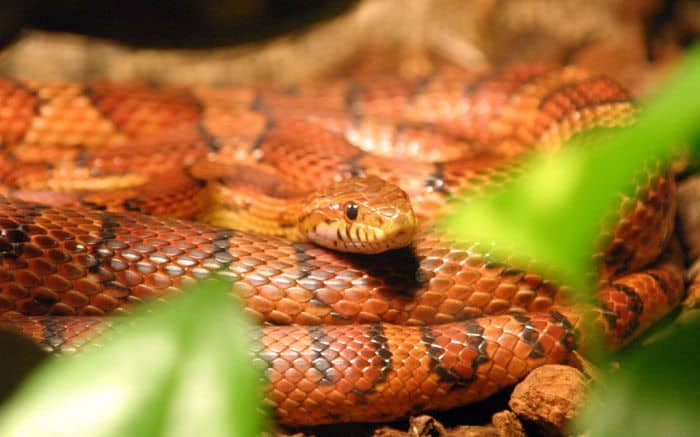Table of Contents
Just as us humans can become sick with respiratory infections, so too can other animals, including snakes. Reptiles that develop respiratory infections such as pneumonia typically do so as a result of bacteria, although this is not to say other cause, such as fungal or viral infections, is out of the question. If your snake is sick, how it is subsequently treated will depend on the cause of the infection.
Why is My Snake Breathing Hard?
A common symptom of a respiratory infection in snakes is breathing difficulty. You might notice that your snake is breathing hard and is holding its mouth open while it breathes. You might also notice discharge around its nose and mouth. It might also stop eating, as well, so a respiratory illness can result in lethargy and weight loss. If you are worried that a respiratory illness is the cause of your snake’s breathing issues, call a vet and have it seen to as soon as possible as it is likely to require a course of treatment (probably antibiotics).
is breathing difficulty. You might notice that your snake is breathing hard and is holding its mouth open while it breathes. You might also notice discharge around its nose and mouth. It might also stop eating, as well, so a respiratory illness can result in lethargy and weight loss. If you are worried that a respiratory illness is the cause of your snake’s breathing issues, call a vet and have it seen to as soon as possible as it is likely to require a course of treatment (probably antibiotics).
However, if your snake appears to be breathing hard or taking deep breaths but without any of the other symptoms of respiratory infection, it could be down to the fact be that it is stressed rather than ill. If a snake is disturbed or moved after eating, for example, you are likely to see heavy or hard breathing as well as the creature appearing to be quite nervous.
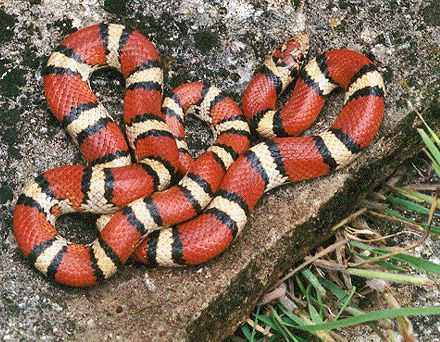
Red Milk Snake 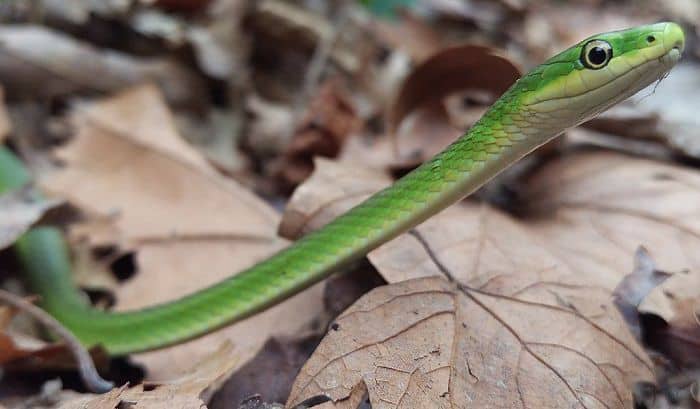
Rough Green Snake 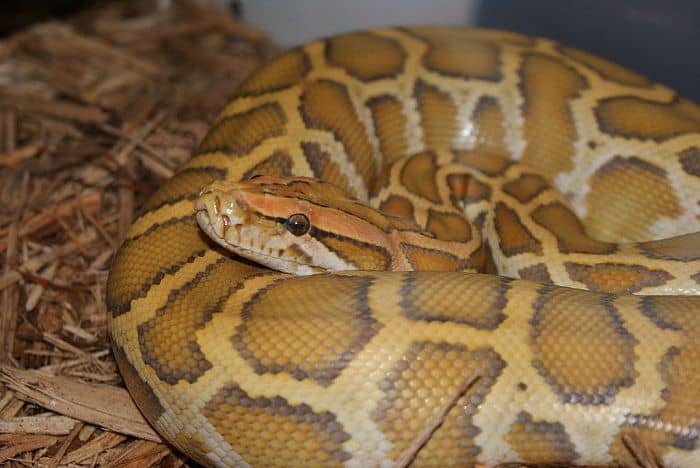
Caramel Burmese Python
Snakes like to be left alone while digesting their food. It is important therefore to not disturb your snake for around 24-72 hours after it has eaten to allow digestion to take place. When you see your snake becoming more active again, it is probably okay to handle it again.
again, it is probably okay to handle it again.
Nevertheless, do note that handling your snake too often can lead to it becoming stressed, which could then result in the ‘hard’ breathing. Other things that can lead to stress in a snake include an enclosure that is too big (which could be making your snake feel vulnerable), an ambient temperature that is too hot or too cold), or being in an enclosure with another snake.
If you are sure that a respiratory infection is not the cause of the hard breathing, check for signs of stress and try to identify the cause.
Should I Be Able to See My Snake Breathing?
Snakes do not have diaphragms like we do but they do inhale and exhale. They do this by contracting and relaxing the muscles around their cages, allowing them to fill their one lung with oxygen. You are likely to see this happening.
If a snake is stressed or has a respiratory condition, you could notice that this action occurs more rapidly than is normal.
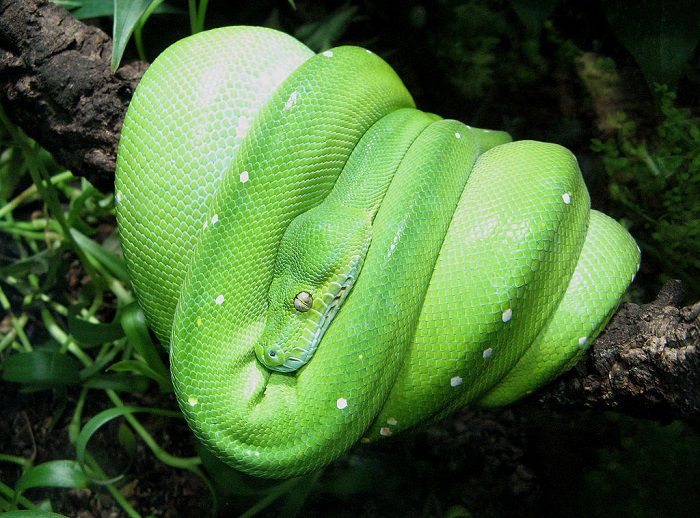
Green Tree Python 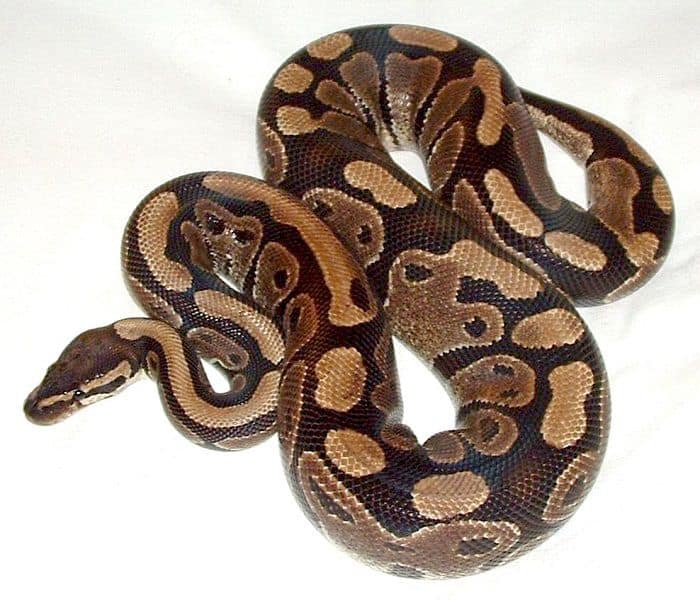
Ball Python 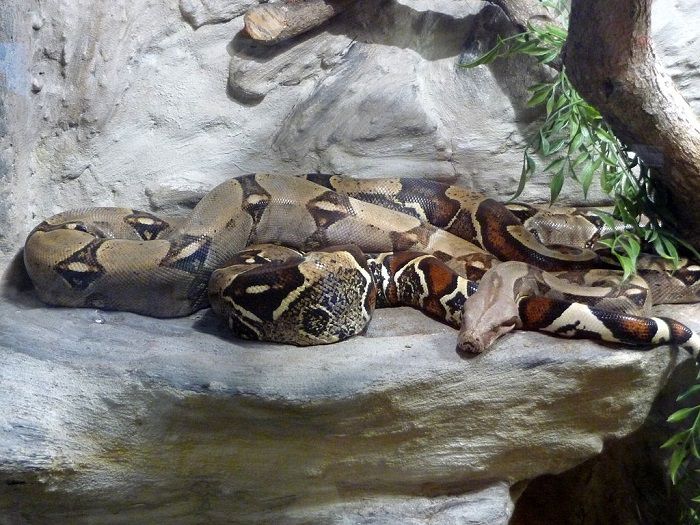
Boa Constrictor
Should I Be Able to Hear My Snake Breathing?
If you can hear your snake making wheezing or crackling noises when breathing, it is more than likely that a respiratory infection is the culprit. Nonetheless, sometimes parasites can affect a snake’s breathing passage, causing wheezing noises or labored breathing.
If you are worried about your snake’s breathing, call your local vet for advice. He or she will examine your snake and might take samples from its nose and throat. Sometimes it may be necessary to take a blood sample to identify the cause of the breathing problems. The results of these will allow the vet to provide the necessary treatment.
Photo Credits:
- Featured Image (Corn Snake): This work has been released into the public domain
 by its author, Mwx
by its author, Mwx at the Wikipedia
at the Wikipedia project. This applies worldwide.
project. This applies worldwide. - Red Milk Snake: Mike Pingleton
 – This file is licensed under the Creative Commons
– This file is licensed under the Creative Commons Attribution-Share Alike 3.0 Unported
Attribution-Share Alike 3.0 Unported license. Subject to disclaimers
license. Subject to disclaimers .
. - Rough Green Snake: Asklēpiós
 – This file is licensed under the Creativ
– This file is licensed under the Creativ e Commons Attribution-Share Alike 4.0 International
e Commons Attribution-Share Alike 4.0 International license.
license. - Caramel Burmese Python: Mark J Andrews II – This file is licensed under the Creative Commons
 Attribution-Share Alike 3.0 Unported
Attribution-Share Alike 3.0 Unported license.
license. - Ball Python: Mokele
 – This file is licensed under the Creative Commons
– This file is licensed under the Creative Commons Attribution-Share Alike 3.0 Unported
Attribution-Share Alike 3.0 Unported license.
license. - Green Tree Python: Micha
 L. Rieser
L. Rieser - Boa Constrictor: Pavel Ševela
 – This file is licensed under the Creative Commons
– This file is licensed under the Creative Commons Attribution-Share Alike 4.0 International
Attribution-Share Alike 4.0 International license.
license.

